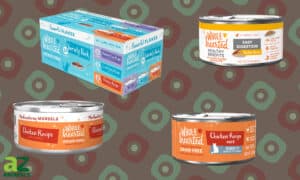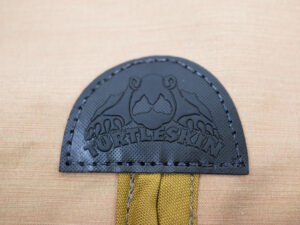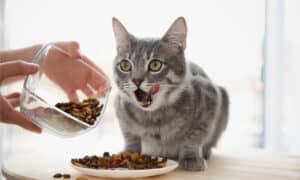| Best for | Product |
|---|---|
| Best Overall | Dr. Bill’s Feline Digestive Support |
| Best on a Budget | Pet Naturals Daily Probiotic Cat Chews |
| Best for Kittens | PetAg Bene-Bac Plus Gel Digestive Supplement |
| Best for Aging Cats | VetriScience Vetri Mega Probiotic Capsules |
| Best for Cats with IBD | Fera Pet Organics Probiotics with Organic Prebiotics |
| Best for Cats with Constipation | TummyWorks Probiotics & Digestive Dog & Cat Supplement |
If you own cats, you know how notorious they are for hiding discomfort. Instead of purring and making biscuits against your blanket, your kitty may hide underneath the bed when they’re not feeling well. It could be bloating or other gastrointestinal upset that you may not be privy to until you have to clean the litter box. Like you, your cat requires a specific diet to remain healthy along with plenty of exercise and play. What most cat owners forget is that the health of their cat’s digestive tract directly impacts how well their immune system functions. When you help them keep their digestive tract well-balanced, with plenty of good bacteria you are naturally improving their overall health.
Your cat doesn’t need to display any form of discomfort to benefit from probiotics. You can incorporate cat probiotics into your kitty’s regular health regimen to keep them in good health and to prevent a variety of different illnesses and diseases, especially those that occur within the gastrointestinal system. Whether you’re looking to better support your cat’s immune system, or you’ve noticed digestive upset like vomiting or diarrhea, probiotics can make a massive difference in how your pet feels and heals.
Long-haired cats, like the Himalayan for example, have a different set of potential issues because of the excessive grooming and ingestion of hair they must deal with. Hairballs can cause this type of cat to vomit more frequently than other breeds. Also, kittens tend to be mischievous, eating things they shouldn’t which causes digestive upset. Other cats, based on their history, may be prone to the development of infections or conditions like inflammatory bowel disease (IBD). Knowing which product to select for your cat can feel overwhelming, especially when you see how many products are available for purchase. To make the process of selecting the best cat probiotics easier for you, we’ve compiled a list of the top probiotics — plus, we give you details on why they’ve made it to this top list.
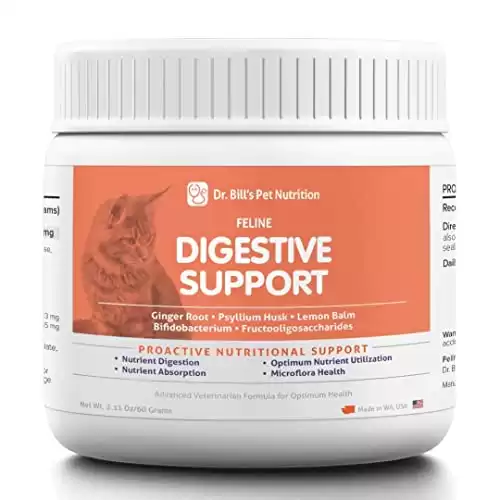 Check Amazon
Check Amazon- Highly recommended by vets, trainers, and breeders.
- Ingredients include ginger root, psyllium husk, lemon balm, bifidobacterium, and fructooligosaccharides.
- The formula incorporates efficacy and palatability.
- Helps with nutrient digestion, nutrient absorption, optimum nutrient utilization, and microflora health.
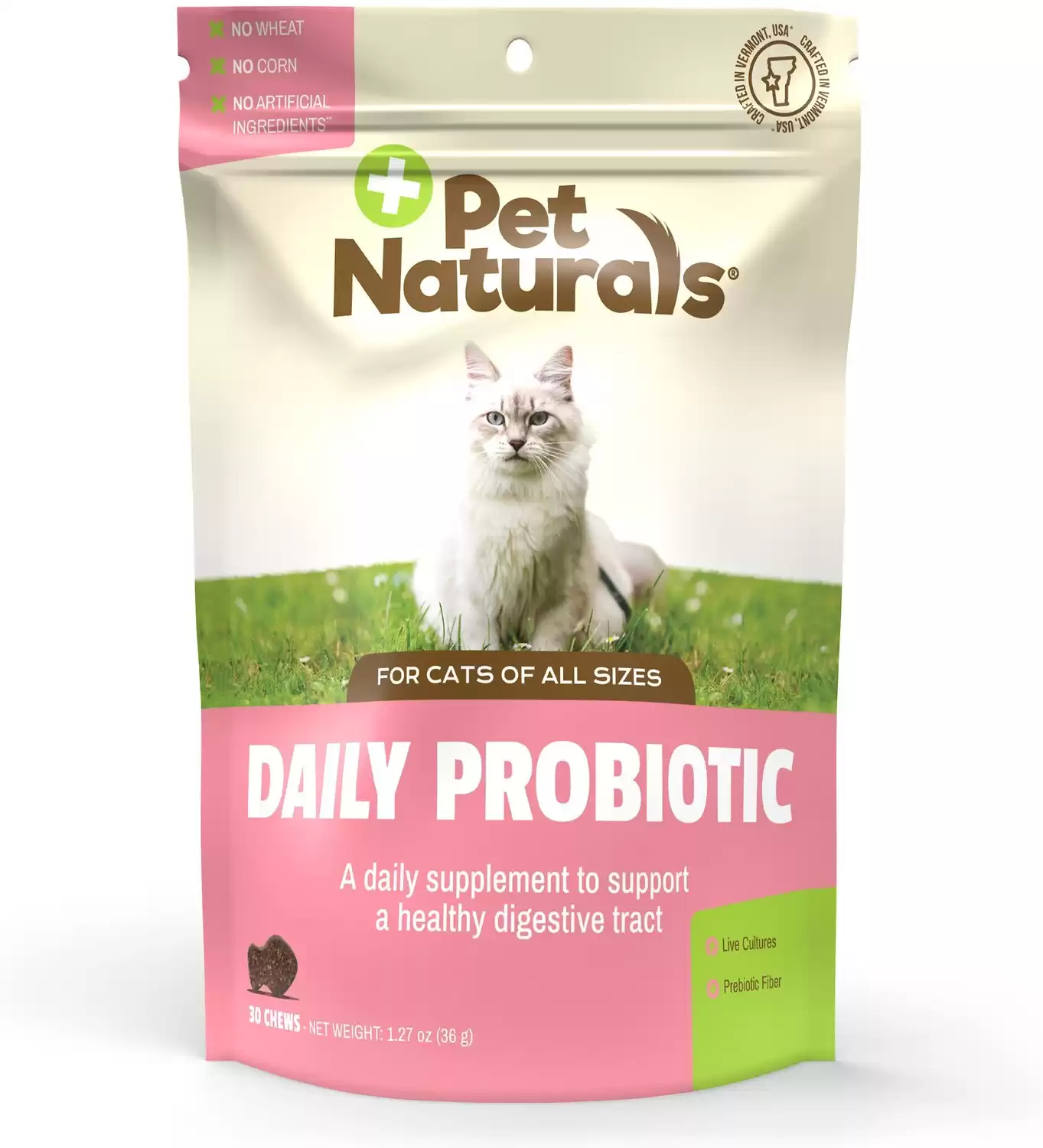 Check Chewy Check Amazon
Check Chewy Check Amazon- Veterinarian formulated, containing fructooligosaccharides and Bacillus coagulans.
- Combine probiotics, that support a healthy gut and healthy digestion, with prebiotics.
- The soft chews come in a duck flavor.
- Guaranteed 100 million CFUs to the gut to support digestive regularity in cats of all ages.
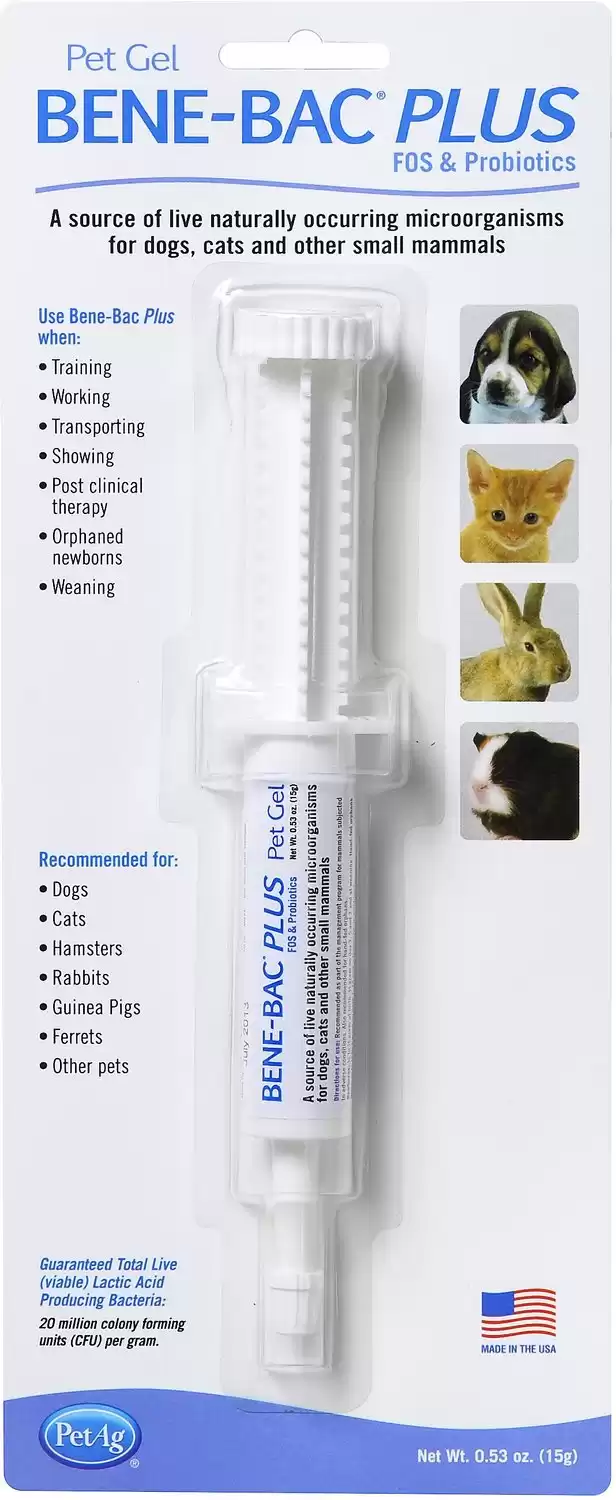 Check Chewy Check Amazon
Check Chewy Check Amazon- Source of live, naturally occurring microorganisms that support small mammals.
- Use it when training, transporting, or weaning
- 20 million CFUs per gram of viable lactic acid-producing bacteria.
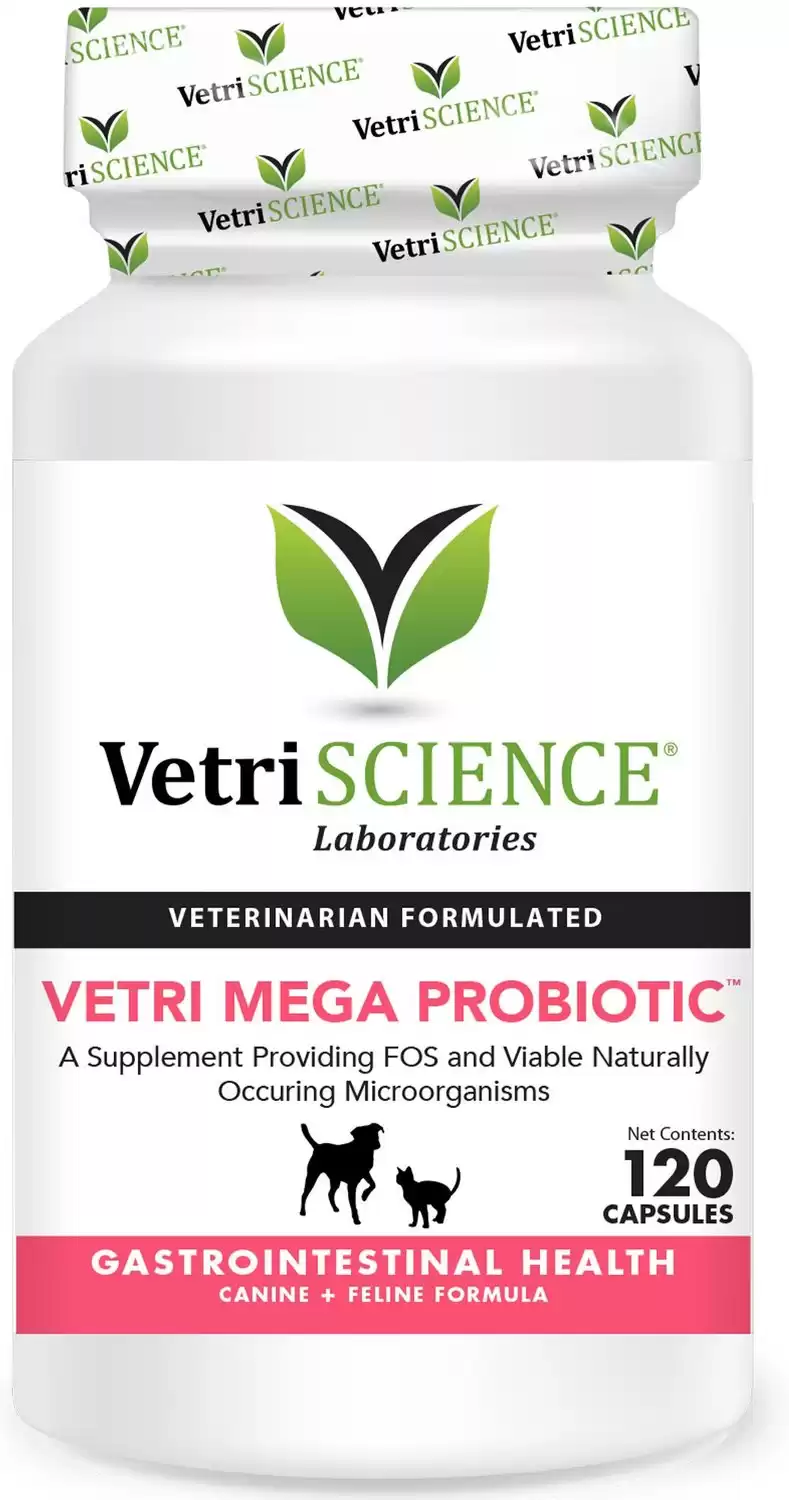 Check Chewy Check Amazon
Check Chewy Check Amazon- Provides FOS and viable naturally occurring microorganisms in capsule form.
- Non-dairy
- Can deliver 5 billion microorganisms, including eight different strains like lactobacillus acidophilus and Streptococcus thermophiles.
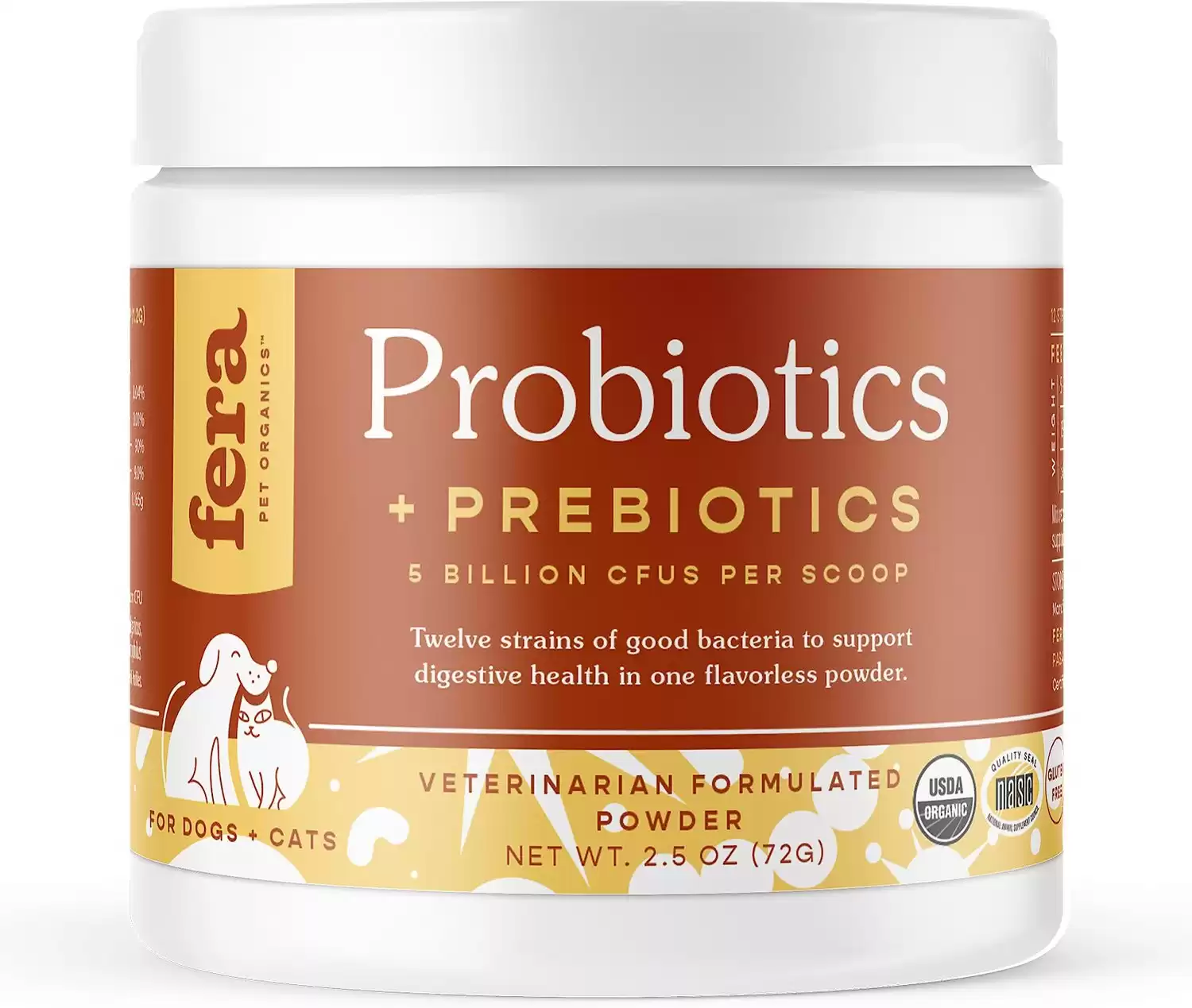 Check Chewy Check Amazon
Check Chewy Check Amazon- Contain a USDA organic certified formula that delivers 5 billion CFU‘s per scoop.
- Contains 12 hand-selected strains with organic prebiotics.
- Boosts immunity.
- Free from additives, fillers, and preservatives.
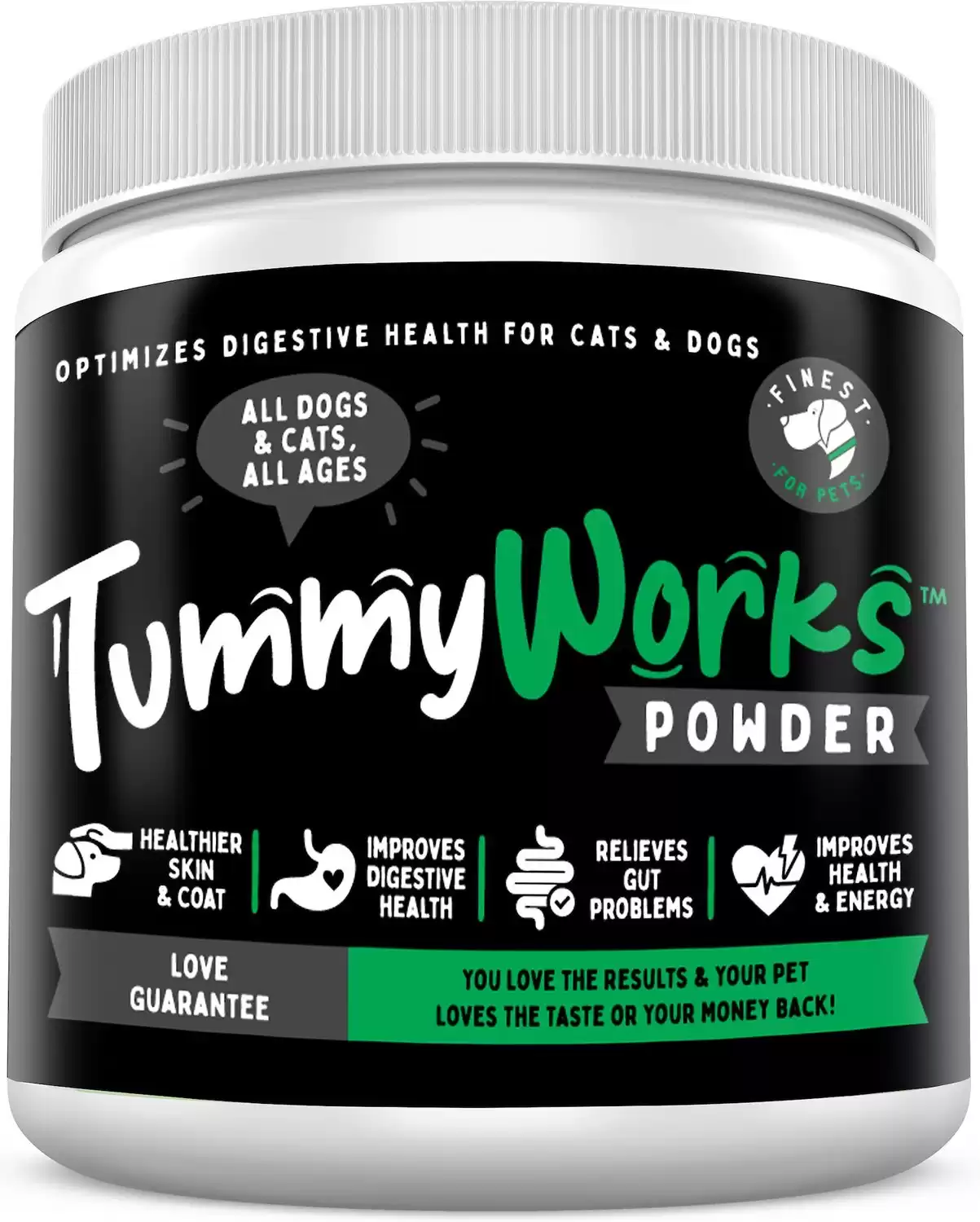 Check Chewy Check Amazon
Check Chewy Check Amazon- Contains10 powerful probiotics that deliver good bacteria to your cat’s digestive tract.
- Six digestive enzymes work to help your cat get the best nutrients from his food.
- Optimize digestive health.
- Boost immunity.
The Best Cat Probiotics: Ranked
#1 Best Overall: Dr. Bill’s Feline Digestive Support
Our choice for the best overall probiotic for cats is Dr. Bill’s Feline Digestive Support, which is the ideal nutritional support for cats in all life stages.
Whether you have a kitten, an adult, or a senior cat, this product helps your kitty with nutrient digestion, nutrient absorption, optimum nutrient utilization, and microflora health. This probiotic comes in powder form that you can easily scoop and incorporate into your cat’s food. Sometimes, kittens experience diarrhea, which isn’t just uncomfortable for your cat but can be a bit of a nuisance for you when it comes time for clean-up. Any disturbance to your kitten’s digestive tract, especially if he’s a rescue, could lead to stomach discomfort. Although adult cats tend to have less frequent diarrhea episodes, this probiotic can keep your cat in good health for longer, helping to delay the onset of age-related gastrointestinal conditions. As cats age, they may lose weight, muscle mass, and overall strength, and could benefit from billions of helpful intestinal bacteria provided via this product.
The ingredients contained within this cat probiotic include ginger root, psyllium husk, lemon balm, bifidobacterium, and fructooligosaccharides. Developed by Dr. Bill Barnett, a veterinarian who has been developing animal products for over 30 years, this supplement is highly recommended by other vets, trainers, and breeders. This formula incorporates efficacy and palatability for even the pickiest of cats so that your pet can benefit from all the powerful, biologically-appropriate, and high-quality ingredients.
Lemon balm is a member of the mint family and is known for its calming qualities. It works to improve appetite and ease any discomfort related to indigestion. It also offers anxiety relief and improves sleep quality. Psyllium husk is a well-known ingredient that cleanses the colon by removing intestinal toxins naturally. It’s high in both dietary fiber and zinc, which helps to stimulate bile acid synthesis and promote good intestinal bacteria. Fructooligosaccharides (FOS) is prebiotic, meaning it is the primary nutrient that your cat’s intestinal bacteria requires. It’s known to balance and maintain beneficial bacteria in your kitty’s digestive tract.
Although this product has a lot going for it some owners have reported that their pets simply refuse to eat it. Additionally, a small number found that their pets vomited after eating it.
Pros and Cons of Dr. Bill’s Feline Digestive Support
| Pros | Cons |
|---|---|
| This product helps with nutrient digestion, nutrient absorption, optimum nutrient utilization, and microflora health. | Some pets refuse to eat this product. |
| This probiotic comes in powder form that you can easily add to your cat’s food. | Some owners have reported that a small number of pets vomit after eating it. |
| It is developed by a veterinarian who has been developing animal products for over 30 years. | |
| This product uses only high-quality powerful ingredients. |
- Highly recommended by vets, trainers, and breeders.
- Ingredients include ginger root, psyllium husk, lemon balm, bifidobacterium, and fructooligosaccharides.
- The formula incorporates efficacy and palatability.
- Helps with nutrient digestion, nutrient absorption, optimum nutrient utilization, and microflora health.
2. Best on a Budget: Pet Naturals Daily Probiotic Cat Chews
The Pet Naturals Daily Probiotic Cat Chews are perfect for when you’re on a budget.
These chews look and taste just like cat treats and they work by combining probiotics that support a healthy gut and healthy digestion with prebiotics, which support healthy gut flora, digestive health, and regularity. You can purchase a 1.27-ounce bag that contains 30 cat chews to keep on hand for the month. They’re suitable for cats of all sizes and contain both live cultures and prebiotic fiber. These are veterinarian formulated, containing fructooligosaccharides and bacillus coagulans.
The soft chews come in a duck flavor and guarantee 100 million CFUs to the gut to support digestive regularity in cats of all ages. Your cat may feel especially stressed during changes to his environment, like while traveling, and probiotics are known to better support your kitty’s immune system, which prevents the development of gas, diarrhea, and constipation. Keep this bag on hand whenever you need it, especially during stressful situations. One daily chew is all your cat needs!
Unfortunately, some owners found their pets just wouldn’t eat these chews, while others reported that they were too hard and difficult to chew for their older pets.
Pros and Cons of the Pet Naturals Daily Probiotic Cat Chews
| Pros | Cons |
|---|---|
| This product is formulated by vets. | Some pets do not like these chews. |
| It contains both live cultures and prebiotic fiber. | The chews are quite hard which makes them difficult for some older pets to eat. |
| This product guarantees 100 million CFUs to the gut to support digestive regularity in cats of all ages. | |
| This probiotic can be given as a simple daily chew. |
- Veterinarian formulated, containing fructooligosaccharides and Bacillus coagulans.
- Combine probiotics, that support a healthy gut and healthy digestion, with prebiotics.
- The soft chews come in a duck flavor.
- Guaranteed 100 million CFUs to the gut to support digestive regularity in cats of all ages.
3. Best for Kittens: PetAg Bene-Bac Plus Gel Digestive Supplement
Our selection as the best probiotics for kittens is the PetAg Bene-Bac Plus Gel Digestive Supplement.
Kitten facts can keep you online all night, while your little floof rests comfortably under your chin. Kittens are undeniably adorable, and this life stage comes with a lot of kitten behavior, which includes crawling into the tiniest spaces to take a nap, chewing on toys, and sometimes even swallowing pieces of them. This digestive supplement comes in a paste and is a source of live, naturally occurring microorganisms that support small mammals. Use it when training, transporting or weaning to help your kitty with 20 million CFUs per gram of viable lactic acid-producing bacteria.
This paste is a concentrated blend of seven naturally-occurring microorganisms that are naturally found in the intestinal tract of mammals. These are especially helpful for new kittens because they do not have any bacteria in their gastrointestinal tract at birth and typically, inoculation is provided by their mother. However, if you are bottle-feeding a kitten, a probiotic could help to speed the growth of the bacteria your kitten’s G.I. tract needs for optimal health. Newborns need just 1/4 to 1/2 gram at birth while hand-fed orphans may do best with 1/2 to 1 gram for a specified period. Larger cats, like Maine Coons, may need extra to support their growing bodies.
The only drawback to this product that we could find is that some pet parents reported that it was difficult to get out of the tube.
Pros and Cons of the PetAg Bene-Bac Plus Gel Digestive Supplement
| Pros | Cons |
|---|---|
| This digestive supplement comes in an easy-to-use paste form. | It is difficult to get out of the tube. |
| This product is a concentrated blend of seven naturally-occurring microorganisms. | |
| It is suitable for newborn kittens, especially those being bottle fed. |
- Source of live, naturally occurring microorganisms that support small mammals.
- Use it when training, transporting, or weaning
- 20 million CFUs per gram of viable lactic acid-producing bacteria.
4. Best for Aging Cats: VetriScience Vetri Mega Probiotic Capsules
Aging cats deserve extra care and support to keep them in good health and comfortable during their senior years, which is why we recommend the VetriScience Vetri Mega Probiotic Capsules.
This probiotic is a supplement that provides FOS and viable naturally occurring microorganisms in capsule form. It’s non-dairy, containing an all-natural source of beneficial microorganisms that help to normalize digestion and support gastrointestinal regularity while promoting immunological and neurological health. Your cat’s microflora balance impacts his skin health, his respiratory system, and his digestive health and with these capsules, you tackle overall health at once.
With each capsule, you can deliver five billion microorganisms, including eight different strains like lactobacillus acidophilus and Streptococcus thermophiles. All your cat needs is half a capsule daily mixed in with his food. However, these capsules are difficult to divide accurately.
Pros and Cons of the VetriScience Vetri Mega Probiotic Capsules
| Pros | Cons |
|---|---|
| This probiotic provides FOS and viable naturally occurring microorganisms. | The capsules are difficult to divide accurately to get the correct dosage. |
| Each capsule delivers five billion microorganisms, including eight different strains like lactobacillus acidophilus and Streptococcus thermophiles. | |
| This product is dairy-free. |
- Provides FOS and viable naturally occurring microorganisms in capsule form.
- Non-dairy
- Can deliver 5 billion microorganisms, including eight different strains like lactobacillus acidophilus and Streptococcus thermophiles.
5. Best for Cats with IBD: FERA Pet Organics — Probiotics with Organic Prebiotics
For pets with IBD we recommend FERA Pet Organics — Probiotics with Organic Prebiotics.
These probiotics contain a USDA organic certified formula that delivers five billion CFU‘s per scoop. Developed by veterinarian Dr. Dulake, this powder probiotic contains 12 hand-selected strains of organic prebiotics to create the perfect formula for cats with IBD. When you incorporate this supplement into your cat’s routine, you’ll find it boosts their immunity, helps them maintain a healthy weight, relieves diarrhea, gas, and bad breath, and improves energy by increasing gut flora.
Simple to use, this formula can be scooped in and mixed with your cat’s regular food. Free from additives, fillers, and preservatives, this probiotic plus prebiotic formula also supports skin health. When cats are uncomfortable, they may exhibit excessive grooming, which could hurt their skin. This formula improves your cat’s whole body health, from the inside out.
Unfortunately, some pet parents have reported that the powder clumps together and has to be broken up with the scoop. Also, others found that their pets wouldn’t eat it at all.
Pros and Cons of FERA Pet Organics — Probiotics with Organic Prebiotics
| Pros | Cons |
|---|---|
| These probiotics contain a USDA organic certified formula. | The powder clumps together. |
| Each scoop delivers five billion CFU‘s. | Some pets refuse to eat it. |
| It contains 12 hand-selected strains of organic prebiotics. | |
| This formula cat be fixed with your cat’s existing food. | |
| This product is developed by a veterinarian. | |
| It is free from additives, fillers, and preservatives. |
- Contain a USDA organic certified formula that delivers 5 billion CFU‘s per scoop.
- Contains 12 hand-selected strains with organic prebiotics.
- Boosts immunity.
- Free from additives, fillers, and preservatives.
6. Best for Cats with Constipation: TummyWorks Probiotics & Digestive Supplement
Sometimes it’s not so much vomiting or diarrhea that’s bothering your cat but constipation an in these cases we suggest the TummyWorks Probiotics & Digestive Supplement.
This formula helps to extract more energy and nutrients from your pet’s food while optimizing his digestive health and boosting his immunity. It mixes easily with his food and works to improve health and vitality while relieving those uncomfortable gut problems.
This powder is loaded with 10 powerful probiotics and six digestive enzymes. While the probiotics work to deliver good bacteria to your cat’s digestive tract, the digestive enzymes work to help your cat get the best nutrients from his food. This two-fold approach helps your cat enjoy more protein from his regular diet, more essential vitamins and minerals, and more energy-giving carbs. You’ll find that it restores his gut performance while eating, improves digestion, and reduces instances of constipation. However, in some cases pet parents have found that their picky eaters do not like this product and will not eat it.
Pros and Cons of the TummyWorks Probiotics & Digestive Supplement
| Pros | Cons |
|---|---|
| This powder is loaded with 10 powerful probiotics and six digestive enzymes. | Some pets refuse to eat it. |
| This formula optimizes digestive health and boosts immunity. | |
| It mixes easily with food. |
- Contains10 powerful probiotics that deliver good bacteria to your cat’s digestive tract.
- Six digestive enzymes work to help your cat get the best nutrients from his food.
- Optimize digestive health.
- Boost immunity.
How to Choose the Right Cat Probiotics
There are a couple of different factors you should consider when selecting the right cat probiotics for your kitty. Ideally, you’re choosing live bacterial probiotics that either has an alluring flavor or are tasteless and can be easily mixed in with food. Consider the following:
Bacterial Strain Diversity
Look at the ingredients list of the probiotic to determine which bacterial strains are incorporated into the product. You should see a wide variety of strains, as this increases the health benefits for your kitty. Although you may be initially tackling a stomach problem, your cat may also benefit from the immune support and the skin health support that a wide variety of strains helps to promote. Look for a high number of CFUs, also known as colony-forming units. You won’t know upfront exactly which bacterial strain your kitty most benefits from, so choosing a multi-strain product gives you a better chance of improving his overall health.
Flavors
While some soft chews may taste like treats, some cats may not like changes to their diet. If your cat tends to turn up his nose to anything he doesn’t recognize, you may need to select a probiotic in powder form, that can be hidden within his current favorite foods. Be mindful if your cat has any allergies or food sensitivities, and be sure to double-check the ingredients list to ensure there’s nothing included in the formula that’ll detrimentally affect your cat’s tummy. A paste may be more helpful for kittens, as it’s easy to lick. knows your kitty better than you, so select a product he will willingly consume.
Incorporation of Prebiotics
Probiotics work best when they are accompanied by prebiotics. Prebiotics help promote the growth or activity of microorganisms that are beneficial to your cat like good bacteria and fungi. Look at the product’s label to determine whether the formula includes prebiotics like fructooligosaccharides or FOS for short.
Specific Health Conditions
Some probiotics are better geared towards specific ailments than others. If you know exactly what you’re trying to treat, connect with your veterinarian to determine which bacteria are most beneficial for your cat’s specific condition. If you’re choosing to incorporate a probiotic to support overall health, you may want to sample different products to determine which best suits your cat. With time, your cat’s health conditions may change, which may necessitate a new product.
Cat Life Stage
Another important consideration is your cat’s current life stage. Some probiotics are best for kittens while others are formulated for adult or senior cats. Make sure you’re selecting a product that is suitable for your cat’s life stage, so they can garner all the health benefits as intended.
Our Criteria: How We Chose the Best
When making our recommendations for the best cat probiotics, we researched many products to find quality ones that met the following criteria:
- Vet Recommended: We want to ensure that we only recommend products that have been formulated or recommended by veterinarians, are USDA approved, or come from legitimate companies that are trusted by animal communities for their high-quality products. Many products we recommend also have money-back guarantees.
- Safety: The ingredients used in these probiotic supplements are safe for your cat, free from agents that could cause skin allergies or rashes. Disclaimer: Every case is unique, so we don’t guarantee your cat won’t have an isolated reaction to a given product. Any reactions in your cat that may arise should be taken up with the manufacturer.
- Ingredients: We located products that have the best ingredients to promote good gut health in your cat; we sought probiotics that had multiple supplements to work as a multi-vitamin option at the same time.
- Flavor: Ideally, your cat will see it’s probiotic supplement as a treat, and ingest in eagerly. We looked for products that are designed to taste good or could be mixed with food easily.
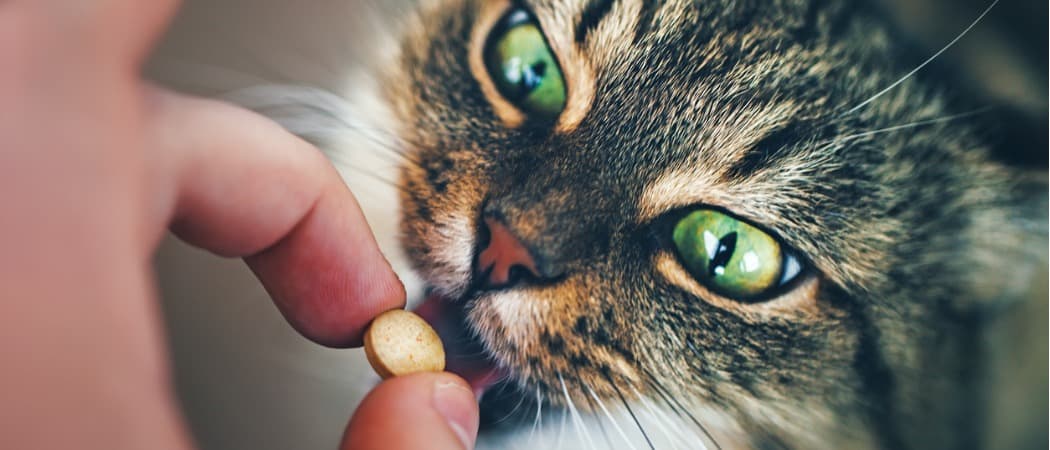
Up Next…
- The Best Cat Food for Indoor Cats
- The Absolute Best Wet Cat Food
- This is the Best Senior Cat Food: We Checked
| Best for | Product |
|---|---|
| Best Overall | Dr. Bill’s Feline Digestive Support |
| Best on a Budget | Pet Naturals Daily Probiotic Cat Chews |
| Best for Kittens | PetAg Bene-Bac Plus Gel Digestive Supplement |
| Best for Aging Cats | VetriScience Vetri Mega Probiotic Capsules |
| Best for Cats with IBD | Fera Pet Organics Probiotics with Organic Prebiotics |
| Best for Cats with Constipation | TummyWorks Probiotics & Digestive Dog & Cat Supplement |
Best Cat Probiotics: Reviewed and Ranked FAQs (Frequently Asked Questions)
Do cat need a prescription for probiotics?
For many of the probiotics you find online no prescription is required. This is because they’re typically sold as supplements, which means they can be purchased by any pet owner. However, there are certain probiotics that do require a prescription, which can be obtained directly from your veterinarian. When starting your cat on a new supplement regimen, ensure you keep channels of communication open with your veterinarian. This will allow you to make the best decision while making sure there is no interference with other medications or your cat’s regular diet.
Are probiotics safe for cats?
Generally speaking, probiotics are safe and well-tolerated by cats. Checking to make sure that you have a trustworthy product from a reputable supplier is the highest priority. This ensures that the ingredients used are clean, leaving out any fillers or additives, which may upset your cat’s stomach. When you can confirm a clean ingredient list, you know that you’re getting a solid product that will help instead of harming your cat. On rare occasions, a probiotic may cause some gastrointestinal upset. If this is the case, the product may contain ingredients your cat doesn’t tolerate well. If this were to occur, discontinue the use of the product to allow symptoms to subside. When selecting the ideal probiotic supplement for your cat, you may need to sample several different products before arriving at one that perfectly complements your cat’s digestive system.
Do vets recommend probiotics for cats?
Veterinarians absolutely recommend probiotics for cats. This is because probiotics work in a variety of ways to promote good gut health and support the immune system. For cats that suffer from digestive issues that lead to appetite changes, diarrhea, vomiting, and constipation, probiotics work wonders. They help to alleviate those symptoms and keep your cat’s gut functioning normally. Probiotics are also extremely helpful if your cat has recently undergone a medical procedure or has been diagnosed with some kind of infection where antibiotics were required. Probiotics help to restore your cat’s gut flora and improve his health, bringing his immune function back to normal.
There are also cats that deal with other issues like excessive grooming that leads to lesions on their skin. Probiotics are versatile in that they support your cat’s overall health, helping to alleviate his most pressing issues. If your cat has been diagnosed with inflammatory bowel disease (IBD), probiotics can help to relieve the discomfort he experiences. These conditions can be not just heart-wrenching to witness, but can also get extremely expensive with vet visits becoming a more common occurrence. To help your cat, especially with persistent conditions, probiotics are recommended.
How fast do probiotics for cats work?
How long probiotics take to work for cats depends on the condition you’re looking to alleviate. In some cases, probiotics work within just a day or two. It depends not just on the condition that you are looking to alleviate, but also on the type of probiotic you’re using. We discussed how to choose the right probiotic for your cat and it’s also important to test it out, give your cat’s body time to respond to it, and then look for results.
For more pressing issues like digestive upset, probiotics work rather quickly. However, if you are looking to support your cat’s immune health, this process could take a bit longer and you may need to administer probiotics for several weeks before you’re able to see a difference in your kitty.
Can cats take probiotics made for humans?
You might be wondering if the probiotics in your supplement arsenal could be easily administered to your cat as well. However, this is not a good idea. Probiotics for cats are created especially for animals, which is what makes them so effective. Instead of reaching for your probiotics to administer to your kitty, purchase a probiotic made specifically for cats.
How to give probiotics to your cat?
Although you may have landed on this page as a result of your cat dealing with digestive upset, veterinarians often recommend that you incorporate probiotics into your cat’s regular health routine. They’re easy to incorporate and so long your cat doesn’t mind the new supplement, it’s a great way to help support his health.
When starting on a new probiotic, follow the manufacturer’s recommendations. Check the product label for instructions based on your cat’s weight. Typically, you’ll need to provide a scoop of a product, a half or full capsule, or a single soft chew per day.
If your cat is extra picky, try to find creative ways to incorporate the supplement into his food. If he has a specific type of food he loves, try sprinkling the contents of a capsule into the food and carefully mixing it so he doesn’t detect a difference. If he loves treats, you may need to try a probiotic that comes in treat form. It may take a little trial and error before you find the right probiotic for your cat but once you do, you’ll see how worthwhile your time spent experimenting was.
Thank you for reading! Have some feedback for us? Contact the AZ Animals editorial team.

